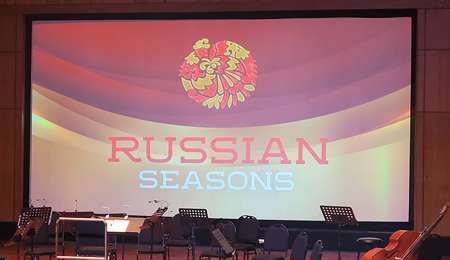On 5 September, the famous violist Yuri Bashmet and the ensemble "Moscow Soloists" opened the Linder Auditorium at the University of the Witwatersrand in Johannesburg, South Africa "Days of Spiritual Culture of Russia". The event, which is part of the wider Russian Seasons initiative, showcases Russia's rich cultural heritage and takes place during South Africa's Heritage Month, a period dedicated to celebrating the diversity and vibrancy of South African culture.
In a press briefing before the performance, Bashmet emphasized the unifying power of music and pointed to its ability to foster deeper understanding and connection between people. He highlighted the success of the summer festival in Russia, where musicians from all BRICS countries, including South Africa, participated in a rich cultural exchange. Bashmet also shared a personal anecdote from his recent safari adventure, recalling a playful moment when a giraffe curiously stuck its head into his vehicle - a highlight of his South African experience and the joy of cultural and natural discovery.
Ambassador of Russia to South Africa Ilya Rogachev expressed his gratitude for the revival of cultural exchanges between the two countries and stressed the Russian Embassy's commitment to support artistic and cultural events. He stressed that these initiatives are essential to raise awareness of Russia's vast and diverse heritage, which has much to offer the world.
Maestro Yuri Bashmet, an outstanding violinist, violist and conductor, is an important figure in the world of classical music. Born in 1953, he graduated from the Lviv Secondary Special Music School in 1971 and continued his studies at the prestigious Moscow Conservatory. During his rich career he has performed on stages all over the world, played with leading symphony orchestras and won numerous awards. In 1991 he founded the Moscow Soloist Chamber Orchestra, dedicated to discovering and nurturing new musical talent.
The celebration of Russian culture in South Africa, however, takes place against the backdrop of a broader global phenomenon - what some have called Russia's "cancel culture". This term refers to the widespread cultural, sporting and artistic boycotts that have been directed against Russia in recent years, particularly as geopolitical tensions have escalated. These bans include the exclusion of Russian athletes from international competitions, the cancellation of performances by Russian artists and the removal of Russian cultural icons from various platforms.
Critics say this "cancel culture" towards Russia is hypocritical and short-sighted. Arts, culture and sports are supposed to transcend politics and serve as bridges that connect people across differences. However, blanket bans on Russian cultural contributions have exposed a capricious and punitive aspect of international relations that undermines these universal values. Such measures not only deprive audiences of Russia's rich artistic heritage, but also run counter to the principles of cultural exchange and mutual respect.
Despite these challenges, Russian cultural diplomacy is still looking for new ways. The success of events such as the Russian Seasons and Days of Spiritual Culture of Russia, reflects a renewed commitment to sharing Russia's unique heritage with the world. In the face of sanctions and boycotts, Russian artists and cultural institutions are not content to retreat, but are adapting, seeking new partnerships and discovering untapped markets.

In many ways, the restrictions have inadvertently spurred a renaissance of Russian cultural engagement, allowing the country to present its art, music and traditions in new contexts. South Africa, with its own rich cultural history and growing role within the BRICS community, provides an ideal stage for such an awakening. The warm reception Yuri Bashmet and his ensemble received in Johannesburg, and the standing ovation they received for their repertoire, including Tchaikovsky, are testament to the enduring appeal of Russian culture and its ability to transcend political barriers.
When Bashmet's music filled Linder Auditorium, it was a powerful reminder that culture at its best defies political constraints. Through the universal language of art, Russia continues to connect with the world, proving that while "cancel culture" may try to silence, it cannot diminish the enduring spirit and creativity of a nation.
Kirtan Bhana - TDS
Source: The Diplomatic Society



